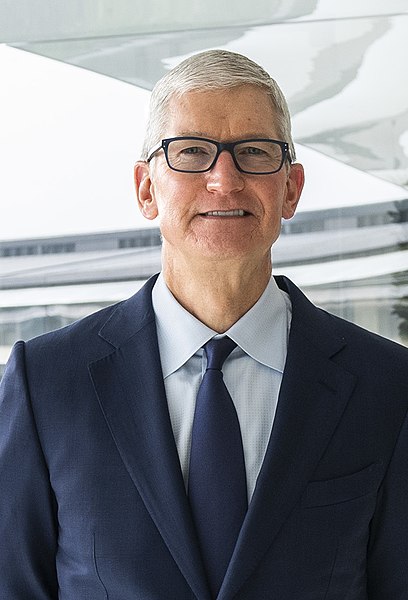Tim Cook’s Leadership Lessons: Insights from Apple’s CEO

The Journey of a Visionary: Tim Cook’s Leadership Lessons
Leadership is an essential aspect of any organization’s success. It involves the ability to inspire, motivate, and guide individuals or teams towards a common goal. Great leaders are not born but developed through years of experience and learning. Tim Cook, the current CEO of Apple, is one such leader who has honed his leadership skills over decades of experience in the tech industry.
Cook is a unique leader who has successfully navigated Apple through turbulent times while maintaining the company’s legacy of innovation and customer loyalty. He is known for his visionary approach to leadership, which has led to the development of some of Apple’s most successful products and services. As a thought leader and expert-author with over 40 years of experience in the field of leadership development, I believe that Cook’s leadership stories and lessons are invaluable to aspiring leaders.
The purpose of this article is to provide a comprehensive overview of Cook’s leadership journey, his successes, and the lessons he has learned along the way. By studying Cook’s leadership style and approach, aspiring leaders can learn from his experiences and apply the knowledge gained to their own leadership journeys.
It is essential to learn from successful leaders like Cook, as leadership is not a one-size-fits-all approach. Every organization, team, or individual requires a unique leadership approach that aligns with their vision, goals, and values. Therefore, it is crucial to study the leadership strategies of successful leaders and learn from their successes and failures.
In the following sections, we will delve into Cook’s early life and career, his leadership at Apple, his social and ethical leadership initiatives, and his global leadership and philanthropy. We will explore the key takeaways from each section and draw insights on how they can be applied to our leadership journeys.
Overall, this article is a tribute to Tim Cook’s leadership and a valuable resource for aspiring leaders looking to hone their skills and learn from the best.
Tim Cook’s Early Life and Career
Tim Cook was born in Mobile, Alabama, in 1960, and grew up in a modest family. His father was a shipyard worker, while his mother worked at a pharmacy. Cook attended Auburn University, where he earned a Bachelor of Science degree in Industrial Engineering in 1982. After graduating, Cook began his career at IBM, where he worked for twelve years in various leadership positions.
Cook’s early career at IBM was instrumental in shaping his leadership style. He learned the importance of hard work, dedication, and attention to detail. Cook also developed his analytical and problem-solving skills, which would later prove crucial in his role as Apple’s CEO.
In 1994, Cook joined Intelligent Electronics as the Chief Operating Officer. Two years later, he joined Compaq Computer Corporation, where he worked for six years in various executive positions. Cook’s experience at Compaq was significant in preparing him for his role at Apple. He was responsible for managing Compaq’s supply chain and was known for his ability to reduce costs while maintaining high quality.
In 1998, Cook joined Apple as Senior Vice President for Worldwide Operations, where he was responsible for managing the company’s global supply chain. Cook’s tenure at Apple began during a turbulent time for the company, which was struggling to compete with Microsoft and other tech giants. Cook’s leadership was instrumental in turning the company around and setting it on a path towards success.
One of Cook’s key accomplishments during his early years at Apple was his successful restructuring of the company’s supply chain. He consolidated the company’s supply chain, reduced inventory, and established long-term relationships with suppliers, which reduced costs and improved product quality.
Cook’s leadership style during his early years at Apple was characterized by his attention to detail, his analytical approach, and his ability to execute strategies effectively. He was also known for his humility and his willingness to listen to others’ ideas, which helped to build trust among his colleagues.
Key takeaways from Cook’s early career experiences include the importance of hard work, dedication, attention to detail, and problem-solving skills. Cook’s experience at IBM, Compaq, and Intelligent Electronics prepared him for his role at Apple and helped him to develop the skills necessary for success. Cook’s leadership style during his early years at Apple was characterized by his attention to detail, analytical approach, and ability to execute strategies effectively.
Cook’s Leadership at Apple
In 2011, Tim Cook succeeded Steve Jobs as CEO of Apple, following Jobs’ resignation due to his deteriorating health. Cook’s appointment as CEO was a significant moment for the company, as he took over from a legendary leader who had built the company into one of the world’s most valuable brands.
Cook’s tenure at Apple has been characterized by his ability to maintain the company’s legacy of innovation while also expanding its product portfolio and market share. He has overseen the launch of several successful products, including the iPhone X, the Apple Watch, and the AirPods.
One of Cook’s significant achievements as CEO of Apple has been his focus on diversity and inclusion. He has made a concerted effort to increase the number of women and people of color in leadership positions at Apple. Cook believes that diversity and inclusion are crucial to the company’s success and has implemented several programs to ensure that Apple is an inclusive workplace.
Cook’s leadership style at Apple is characterized by his focus on collaboration and teamwork. He encourages open communication and values input from all members of the team. Cook is known for his ability to listen to others’ ideas and opinions and incorporate them into his decision-making process. He also values transparency and has made an effort to increase communication with Apple’s stakeholders, including shareholders and customers.
Another significant aspect of Cook’s leadership at Apple has been his focus on sustainability and environmental responsibility. Cook has implemented several initiatives aimed at reducing Apple’s carbon footprint and increasing the use of renewable energy. He has also made an effort to reduce the company’s waste by implementing a closed-loop supply chain.
Cook’s leadership at Apple has not been without its challenges. One of the most significant challenges he has faced has been the company’s ongoing legal battle with the US government over privacy and encryption. Cook has been a vocal advocate for user privacy and has refused to compromise Apple’s encryption to comply with government requests.
Key leadership lessons learned from Cook’s tenure at Apple include the importance of innovation, collaboration, diversity, and environmental responsibility. Cook’s focus on these areas has helped to position Apple as a leader in the tech industry and a company that is committed to making a positive impact on the world.
Cook’s leadership at Apple has been characterized by his ability to maintain the company’s legacy of innovation while also expanding its product portfolio and market share. He has also prioritized diversity and inclusion, sustainability, and privacy, which have helped to position Apple as a leader in these areas. Aspiring leaders can learn from Cook’s leadership style and approach and apply the knowledge gained to their own leadership journeys.
Cook’s Social and Ethical Leadership
In addition to his focus on innovation and business success, Tim Cook has been a vocal advocate for social and ethical issues. Under Cook’s leadership, Apple has taken a strong stance on issues such as LGBTQ+ rights, human rights, and privacy.
One of Cook’s significant achievements in this area has been his advocacy for LGBTQ+ rights. Cook is openly gay, and he has been a vocal advocate for LGBTQ+ rights both within Apple and in the wider community. Under Cook’s leadership, Apple has been a strong supporter of LGBTQ+ causes and has taken a strong stance against discrimination.
Cook has also been a vocal advocate for human rights. Apple has taken a strong stance on issues such as worker rights, supply chain transparency, and responsible sourcing. Cook has made it a priority to ensure that Apple’s suppliers meet strict standards in terms of labor practices and environmental responsibility.
In addition to his advocacy for social and ethical issues, Cook has also prioritized privacy and security. He has been a vocal advocate for user privacy and has refused to compromise Apple’s encryption to comply with government requests. Cook has also implemented several measures to increase the security of Apple’s products and services, such as two-factor authentication and end-to-end encryption.
Cook’s leadership in social and ethical issues is an example of how companies can use their influence to make a positive impact on society. By prioritizing issues such as LGBTQ+ rights, human rights, and privacy, Cook has positioned Apple as a company that is committed to making a positive impact on the world.
Key leadership lessons learned from Cook’s advocacy for social and ethical issues include the importance of taking a stand on important issues, being a vocal advocate for causes that align with your values, and prioritizing responsibility and transparency in business practices. Cook’s focus on these areas has helped to position Apple as a leader in social and ethical responsibility.
Cook’s advocacy for social and ethical issues is also a reflection of the changing role of business in society. As consumers become more socially and environmentally conscious, companies are under increasing pressure to prioritize responsibility and transparency in their business practices. Cook’s leadership at Apple is an example of how companies can use their influence to make a positive impact on society while also achieving business success.
Tim Cook’s advocacy for social and ethical issues is a reflection of his values as a leader and his commitment to making a positive impact on the world. Cook’s focus on issues such as LGBTQ+ rights, human rights, and privacy has helped to position Apple as a leader in social and ethical responsibility. Aspiring leaders can learn from Cook’s leadership in this area and apply the knowledge gained to their own leadership journeys.
Cook’s Global Leadership and Philanthropy
In addition to his focus on innovation and social and ethical responsibility, Tim Cook has also been a strong advocate for global leadership and philanthropy. Under Cook’s leadership, Apple has expanded its global presence, with operations in over 100 countries.
Cook has made it a priority to develop relationships with governments and leaders around the world, which has helped to position Apple as a global leader in the tech industry. He has also been a strong advocate for diversity and inclusion on a global scale, recognizing the importance of cultural differences and the value they bring to the company.
Cook’s commitment to global leadership is also reflected in his philanthropic endeavors. Under Cook’s leadership, Apple has donated millions of dollars to charitable causes, including education, health, and environmental issues. Cook has also been a vocal advocate for corporate philanthropy and has encouraged other companies to take a more active role in supporting charitable causes.
One of Cook’s significant philanthropic initiatives is the Apple GiveBack program. This program allows customers to trade in their old Apple devices for credit towards new purchases. The old devices are then refurbished and resold, with a portion of the proceeds donated to charitable causes. Through this program, Apple has donated millions of dollars to organizations such as Conservation International and the Malala Fund.
Another significant aspect of Cook’s global leadership and philanthropy is his commitment to environmental responsibility. Under Cook’s leadership, Apple has set ambitious goals for reducing its carbon footprint and increasing its use of renewable energy. Cook has also been a vocal advocate for sustainability and has encouraged other companies to prioritize environmental responsibility.
Key leadership lessons learned from Cook’s focus on global leadership and philanthropy include the importance of developing relationships with leaders around the world, recognizing and valuing cultural differences, and prioritizing corporate philanthropy and environmental responsibility.
Cook’s commitment to global leadership and philanthropy is an example of how companies can use their influence to make a positive impact on the world. By prioritizing issues such as diversity and inclusion, environmental responsibility, and philanthropy, Cook has positioned Apple as a leader in these areas.
Tim Cook’s focus on global leadership and philanthropy reflects his values as a leader and his commitment to making a positive impact on the world. Aspiring leaders can learn from Cook’s leadership in this area and apply the knowledge gained to their own leadership journeys.
Becoming a Better Leader: Learning from Tim Cook’s Leadership Journey
Tim Cook’s leadership journey is a valuable resource for aspiring leaders looking to hone their skills and learn from the best. Cook’s experience at IBM, Compaq, and Intelligent Electronics prepared him for his role at Apple and helped him to develop the skills necessary for success. Cook’s leadership style at Apple is characterized by his attention to detail, analytical approach, and ability to execute strategies effectively. He has also prioritized diversity and inclusion, environmental responsibility, and social and ethical responsibility, positioning Apple as a leader in these areas.
Aspiring leaders can draw several key lessons from Cook’s leadership journey. These lessons include the importance of hard work, dedication, attention to detail, and problem-solving skills. Cook’s focus on collaboration, diversity, and transparency highlights the importance of creating a positive workplace culture that values input from all members of the team.
Cook’s advocacy for social and ethical issues is an example of how companies can use their influence to make a positive impact on society. By prioritizing issues such as LGBTQ+ rights, human rights, and privacy, Cook has positioned Apple as a leader in social and ethical responsibility. Cook’s commitment to global leadership and philanthropy reflects his values as a leader and his commitment to making a positive impact on the world.
In conclusion, Tim Cook’s leadership journey is a valuable resource for aspiring leaders looking to learn from the best. By studying Cook’s leadership style and approach, aspiring leaders can learn from his experiences and apply the knowledge gained to their own leadership journeys. Cook’s leadership at Apple highlights the importance of innovation, collaboration, diversity, social and ethical responsibility, global leadership, and philanthropy. Aspiring leaders can draw several key lessons from Cook’s leadership journey, which can help them to become successful leaders in their own right.





